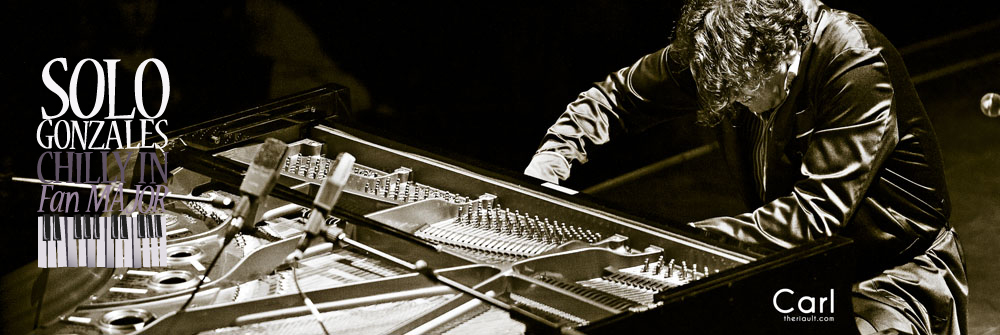 “Fuck Wagner” can easily be mistaken for just another provocative song. It is provocative. Thought-provoking. It addresses nothing less than a question almost as old as time: Do art and artist form a firm unity, or can they be separated? And there’s more to it than meets the eye, especially when it comes to Wagner, one of Germany’s most treasured antisemites, the pompous composer, who has been religiously admired by Hitler and some of today’s cultural elites alike.
“Fuck Wagner” can easily be mistaken for just another provocative song. It is provocative. Thought-provoking. It addresses nothing less than a question almost as old as time: Do art and artist form a firm unity, or can they be separated? And there’s more to it than meets the eye, especially when it comes to Wagner, one of Germany’s most treasured antisemites, the pompous composer, who has been religiously admired by Hitler and some of today’s cultural elites alike.
Chilly Gonzales premiered his new statement piece “Fuck Wagner” with a drumbeat on German TV. During Jan Böhmermann’s ZDF Magazin Royale, the song opened with a “prelude” in a carefully staged, 19th-century study where Gonzo is sitting at a massive wooden desk, opulent tapestry ornamenting the walls, a piano in the background. He is wearing a new Herr von Eden tuxedo and is seen writing a letter addressed to the citizens of Cologne to the subtle piano tunes of “We Don’t Need Another Hero” in the background. From the start, his voice softly laments about how walking on Richard-Wagner-Strasse arouses his anger: Wagner wrote the essay “Das Judenthum in der Musik”, a pamphlet in which he lays comparison to the animal world and doubts the ability of Jewish artists to produce art – and worse. While Gonzo doesn’t suggest canceling Wagner, he suggests canceling the admiration for the man, not the music. Then a zoom towards a portrait behind him: While he is proposing to change Richard-Wagner-Strasse to Tina-Turner-Strasse, the woman herself, Tina Turner, is smiling down on him as he leaves for the TV studio to kick-off the song with a bang and some help from the show’s orchestra, RTO Ehrenfeld.
Teenage-Gonzo and the Holy Grail
Wagner’s views have to be framed in the context of an increasing late 19th-century intellectual diarrhea epidemic that laid the foundation for the sh… that followed between 1933 and 1945. Wagner and like-minded individuals can be seen as the pervert pioneers of institutionalized antisemitism. At the same time, “King Kong has conquered Western culture” as the “Fuck Wagner” lyrics go, meaning Wagner has become a staple and his oeuvre has undoubtedly been globally recognized. So how should society deal with this ambiguity? Gonzo’s answer is clear: Separate the art from the artist. Hate Wagner, but don’t hate his music. Enjoy his works, but don’t put its originator on a pedestal. That’s why he turned his claim to rename Richard-Wagner-Strasse into action: He didn’t only speak to the district mayor, he also started a petition. I did sign it and feel like the time couldn’t be more right.
In an interview for Bayerischer Rundfunk with Shahrzad Osterer, Gonzo gives more insights into his long-term relationship with “the monster”, as he calls him – and believe it or not, Sologonzales’ better half Andrew made predictions as early as in 2012 when Gonzo’s “Grudge” led him to Wagner’s grudge – some theories suggest it was a fellow Jewish composer that ignited the antisemitic hellfire within Wagner from a young age. Back to Gonzo. At the age of 16, his father took teenage-Gonzo to Bayreuth, the “Holy Grail” of Wagnerianism, to see the “Ring der Nibelungen”, a several day-long spectacle almost impossible to get tickets for as an ordinary mortal. He loved it. When he started researching about the composer though, he discovered that “he’s a monster – and not just your average monster or your usual antisemite”. As the most famous artist of his time, “the Kanye of the 19th century”, he wasn’t shy to express his evil opinions and to use his grand stage. “It’s hard not to take it personally,” Gonzo comments, “but that doesn’t mean you have to stop listening to the music. It’s very difficult to do, but we are capable of it. This is my answer to cancel culture.” How difficult this is, becomes apparent in conversation with Shahrzad, when Gonzo asks her: “One can be a monster and still make beautiful music. What do you think?” For her, it’s almost impossible. When somebody is or was an antisemite or a misogynist, it takes the enjoyment out of the oeuvre.
“We can honor the art but we are allowed to dishonor the artist”
A conversation that illustrates the complexity the topic carries. Shahrzad is a remarkable woman who has become a reasonable yet strong voice for women’s and human rights within the German media landscape. When she speaks, you feel the consideration and power of every word – she uses them as a sharp knife against injustice and oppression. She escaped the mullah regime in Iran when she was 19 and came to Germany where she found a new home in Munich, perfected the language, and rose to be a journalist. The love for her motherland is deeply rooted within her and so is the love for the Jewish community to which she converted. You can feel her pain for the people of Iran and Israel and her disdain for Islamic regimes and Western governments’ inability to take action in order for freedom to reign. She’s part of a network of exiled women in Germany who have one thing in common: They fight for what is right. Shahrzad has experienced antisemitism and hate in Germany herself and more than once contemplated whether it’s still safe to live there.
Yet she adds: “For me, it’s even more difficult if such artists are being admired with streets named after them and statues being erected.” For Gonzo, this is exactly the bridge between both perspectives and common ground: “Part of separating the art from the artist means, we honor the art but we are allowed to dishonor the artist.” When Gonzo walks along Richard-Wagner-Strasse in Cologne, it leads him to where the synagogue is and to the inevitable: “Something is not right here! The street is named after the artist, not the art. It’s not ‘Parzival Strasse’ or ‘Tristan & Isolde Allee’.” For him it seems only right to rename the street after Tina Turner, who recently passed away and spent almost ten years in Cologne. As a German living in Zurich, close to where she lived for the past 20 years (she even learned German to attain the Swiss passport, and I saw her several times strolling along Bahnhofstrasse), that’s something I’d immediately co-sign and find very befitting here, too. However, in addition, I would love to see those streets named after Jewish artists. Where I live, you find the same paradox: Richard-Wagner-Strasse round the corner from the synagogue and in a district that is known for its huge and active Jewish community. And believe it or not – there is not one Marc-Chagall-Strasse in Zurich, even though the artist’s famous windows of Frauenkirche right behind Paradeplatz are one of the city’s main tourist attractions.
How enjoyable is a convicted pedophile indulging in car driving metaphors for sex?
Separating the art from the artist has been a dominant tension in my life since I studied literature. When you read a book, it always opens up the door into someone’s brain to a certain extent and lets you live in it for a while. If someone was an antisemite, how much can you enjoy the work and above all – how much will your interpretation be tainted and skewed by what you know about the author (no matter how hard you try to ignore the originator)? Or follow me on a theoretical journey. If you separate the art from the artist, should this page even exist? We have always emphasized, this website is not about the person, but the art. Is that really true? If art should exist by itself, how relevant is the aforementioned interview and the fact that I’m writing about it? In this case, quite relevant, I’d say. Both add not only context; they create something that goes beyond art: leaving a mark for something that you’re passionate about. In this case, music is a mere vehicle. A vehicle carrying the thoughts of a bigger cause. Causes that fit into my own canon of values.
What if that wasn’t the case? If Chilly Gonzales was an antisemite – is there a chance I wouldn’t even know his music? Yes. Would I follow his Instagram? No. Would I have attended 50+ concerts since 2008? Definitely not.
In “Fuck Wagner”, Gonzo references R. Kelly’s “Ignition” to further delve into the dilemma: “It’s hard to boycott something that you love/But it’s easy if you hate it/Like if I never hear Richard Wagner again, I know I wouldn’t miss him/But I still bang that R. Kelly remix to ‘Ignition’.” And during the TV performance, you even hear the famous hook of the song in the background. As someone who went crazy for “Ignition” and doesn’t care for Wagner’s Teuton tamtam, I can deeply relate. However, since we know what we know about R. Kelly, I have barely listened to the song. And if I did, I did it all by myself and felt guilty. The voice of a convicted pedophile indulging in car driving metaphors for sex is just too much even though the melody is irresistible. I wish somebody would do a cover of it and change the lyrics – or come up with an instrumental version.
As much as I love Gonzo’s stance, I’m not sure if I share it 100%. But – as I said in the beginning – it’s thought-provoking and too intellectually stimulating to be dismissed: the question whether slaying the dragon would kill the monster.
